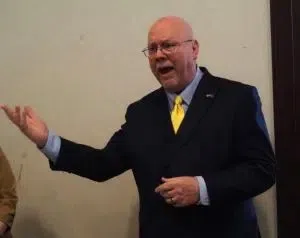
Rainwater (Libertarian candidate for governor at March 2024 forum)-Courtesy of Whitney Downard/Indiana Capital Chronicle
INDIANAPOLIS – Donald Rainwater is no stranger to campaigns. The Libertarian has run for state Senate, the House of Representatives, and for mayor of Westfield.
But it was his 2020 run for governor that brought unprecedented attention to Rainwater, who ran on a platform with several pillars — the most timely of which opposed several of Gov. Eric Holcomb’s COVID-19 actions.
Rainwater went on to win 11.4% of the vote, a high for a third-party candidate in Indiana. And he thinks he can do even better in 2024.
“I always get a kick out of it because the question is, “Do you hope to do as well?’ No, I hope to win or I wouldn’t bother doing it,” Rainwater said. “Are the odds against me? Certainly. But I have a chance.”
That chance comes from his efforts to appeal to all Hoosiers, rather than a political or demographic subset, he said.
But his first political run was prompted by something much smaller than a global pandemic: a 2016 radio ad pushing to increase the cigarette tax, which the promotion claimed would have the dual benefit of reducing smoking rates while also raising state revenue.
“That’s just intellectually dishonest because you cannot discourage people from smoking and raise money with a tax. Because either people will quit smoking, which means they quit paying the tax, or you’re going to raise money for the roads,” Rainwater said. “You can’t do both. So saying that your goal is to do both, to me, is a little offensive.”
And so Rainwater jumped into politics.
Rainwater emphasized that none of his platforms should be seen as a “promise” to voters, especially considering that he’d have to work with the General Assembly, which controls both the purse strings and the legislative process. Republicans have controlled both chambers for over a decade.
“I can’t make promises. I’m running for governor, not king,” Rainwater quipped.
Read about Rainwater’s platform and his proposals for Indiana in the Whitney Downard story for the Indiana Capital Chronicle, here.




